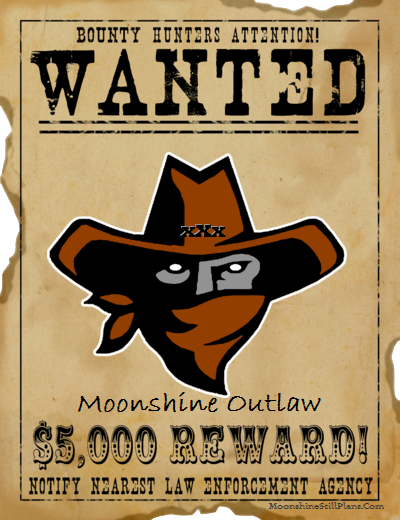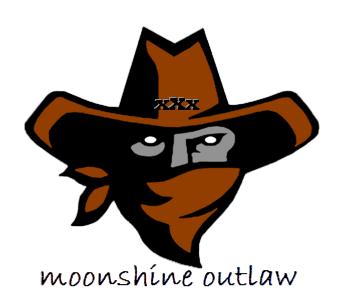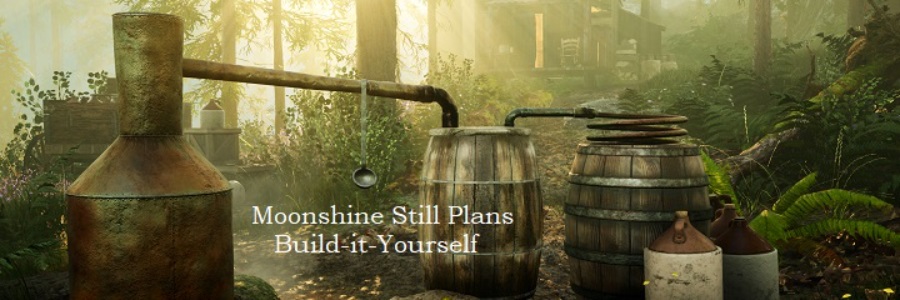Moonshine Laws and History
 The word "moonshine" and its widely known use for illicit spirits is believed to have
originated from the term "moonrakers".
The word "moonshine" and its widely known use for illicit spirits is believed to have
originated from the term "moonrakers".
This term labeled early English smugglers and the nature of their distilling operations along with the distribution of illegal Appalachian produced whiskey.
The term "moonshine" generally implies to liquor that is produced illegally. However, the term is now used in modern times on labels of legally produced products for its nostalgic history.
Unless you're a rebel and the thought of digging ditches with chains around your ankles doesn't bother you, you best get your wits about you on the legalities of making moonshine in your area.
Is It Legal To Make Moonshine? - Know Your Rights to Avoid Becoming A Moonshine Outlaw!
There are both federal and state laws in the United States that regulating home distilling. You will need to comply with these laws, as well as any local laws or regulations governing the production of moonshine.
Moonshine, hooch, white lightning, mountain dew, and homebrew are all common terms used to describe high-proof distilled spirits that are generally produced illicitly without regard for the law.
Liquor-control laws in the United States prohibit the distillation of alcohol without the proper permits, and once was completely banned by law under the 18th Amendment to the United States Constitution. Control of alcohol distillation is now enforced by the Bureau of Alcohol, Tobacco, Firearms and Explosives of the United States Department of the Treasury.
Federal Distillation Laws and Permit Requirements
 Under
Federal law it is legal to own a still of any size and it does not need to be registered,
nor are any permits required. It may legally be used for decoration, distilling water, distilling
essential oils, etc.
Under
Federal law it is legal to own a still of any size and it does not need to be registered,
nor are any permits required. It may legally be used for decoration, distilling water, distilling
essential oils, etc.
However, a "distilled spirits permit" or a "federal fuel alcohol permit" is required to distill alcohol.
The permit is needed even if the alcohol is for personal use only, not for sale. A permit is required for a still to be used for distilling either fuel alcohol or spirits.
Legal Alcohol Distillation Requires A Federal Distilled Spirits Permit or Federal Fuel Alcohol Permit
To legally distill alcohol, there are two options:
- Obtain a Federal Distilled Spirits Permit.
- This permit allows distilleries like Jim Beam and Makers to legally distill and distribute alcohol to the public. As you can imagine, it is not an easy permit to get.
- Obtain a Federal Fuel Alcohol Permit, which is free and easy to get. However, beware that the feds will expect this alcohol is in fact a fuel and not for drinking!
Federal laws state that a still only needs to be registered if the Federal Alcohol and Tobacco Tax and Trade Bureau asks the manufacturer to do so. Though, again, if you are using it to distill alcohol, you will want to get a federal fuel alcohol permit, or a federal distilled spirits permit, if that is what it is used for.
State Distillation Laws
State distilling laws vary from state to state.
- Some states have no governing laws on owning a still, but prohibit the distillation of alcohol.
- Other states prohibit possession of a still unless it's for fuel alcohol, and in this case you are generally required to have a state fuel alcohol permit.
- Some states may prohibit possession of distillation equipment and distilling altogether.
Federal Regulations on Still Registration and Reporting
Federal Alcohol and Tobacco Tax and Trade Bureau regulations state that still manufacturers are required to keep customer purchase information records. These records may also be requested by the Federal Alcohol and Tobacco Tax and Trade Bureau TTB. In this case still manufacturers are required to submit them if asked.
How to Avoid Trouble With The Law
Beware: Federal law provides no exemptions for the production of illegal distilled spirits for personal, family, or any other use without proper permits. Under no circumstances is it legal to distil or sell alcohol without proper permits in place. federal distillation laws.
Hazards Of Distilled Alcohol
Carelessly and poorly produced moonshine can be contaminated, mainly from materials used in the construction of the still. Stills employing condensers made from automotive radiators are particularly dangerous. In some cases, glycol from antifreeze appears as one contaminant. These radiators may also contain lead in the soldered connections to the plumbing. Contaminations like these can, and have led to health issues including blindness or poisoning for those consuming this tainted liquor.

